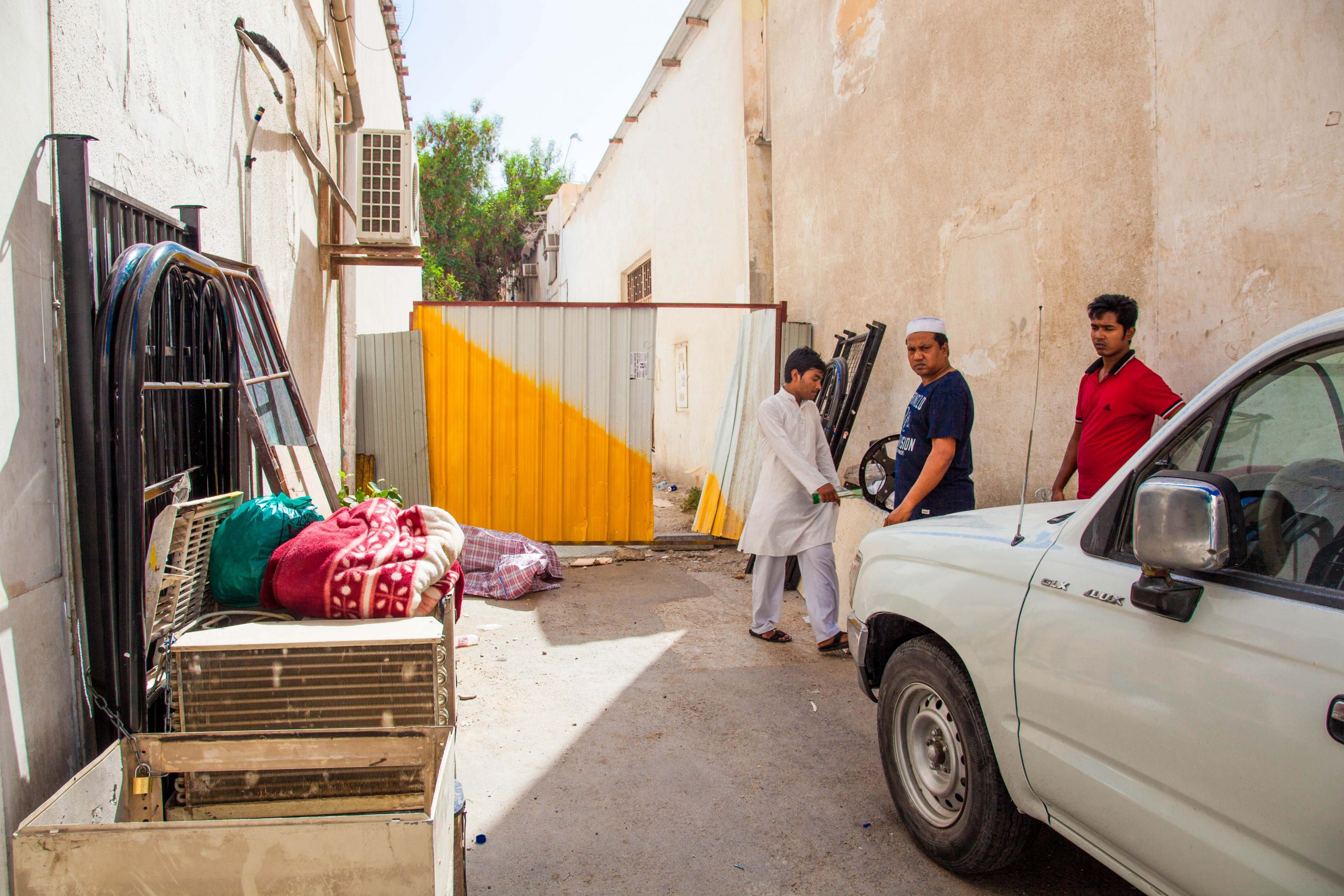
With reporting from Riham Sheble
Days after several hundred men were forcibly evicted from their homes in downtown Doha, many are still struggling to deal with being displaced; some have even snuck back into their accommodations.
Speaking to Doha News on Friday, several expats affected by the evictions said the last three days have been a nightmarish experience, exacerbated by the searing heat and a lack of food, water and electricity.
Many acknowledged that they did receive eviction notices prior to being removed from their homes, but said they paid little attention to the fliers because they were in Arabic.

The Asmakh area of Musheireb includes a handful of newish, larger apartment buildings, and dozens of flat-roofed, shack-like structures.
One notice, which was posted last week on several of the small shacks, states that resident would have to evict within three days, that they had been previously notified that electricity would be cut off, and that the ISF would be enlisted to help enforce the evictions of remaining tenants.
But many said they ignored these fliers because they could not read Arabic. The vast majority of people staying in area from South Asian countries, including India, Nepal and Pakistan.
Qatar has big plans for the Musheireb area, and many of the ramshackle buildings there are slated to be demolished to make way for more upscale developments.
But this creates a posed a problem for the thousands of people who currently live in these homes – many only make QR1,000 to QR1,800 a month, and say they don’t know where else they can afford to go.
Occupancy
During last week’s raid, the buildings in the Asmakh area were not been completely emptied. Families living there have apparently been given a few weeks to move.
Speaking to Doha News, a Yemeni ministry worker said that when the police saw his wife and children, they agreed to let them live in the area until the end of Ramadan.
Others without families have also been granted a few weeks’ stay, after their employers negotiated with developer Ezdan Real Estate.
When reached for comment about the evictions, a representative at Ezdan told Doha News:
“Regarding this particular location – the participation of Ezdan is we’re just making the contract between the government and tenants there. This decision to oust them is not within Ezdan’s realm. It’s within the government.”
It is not clear which government entity is involved with the evictions. The Ministry of Municipality and Urban Planning typically serves notice to tenants in the event that a building is slated for demolition. But the MMUP has not returned a request for comment.
Returning to sleep
During the daytime on Friday, the area where the evictions took place appeared to be littered with garbage and pieces of furniture.
After Internal Security Forces (ISF) removed tenants from their buildings on Tuesday night, police began routinely patrolling the area to check for stragglers.
According to shopkeepers, many of those who lost their homes vacate the area during the day, but return after sunset. Speaking to Doha News, one store manager in the area who asked not to be named said:
“The police have been here every night since (the eviction). Around eight or nine cars showed up on (Thursday) night.
During the day, (the former tenants) go to work, or go to their friends’ to escape the heat. In the night, they come back here to sleep on the streets. But the police come and remove them. If they talk back, they are beaten or pushed and taken away in police cars.”
Abdullah Sayed, who spoke to Doha News previously, said he lived in a large building and has managed to sneak back into his apartment without attracting any repercussions.
The reprieve is sure to be temporary, but his situation appears considerably better than many of those who lived in the shacks, where electricity and power have been cut off completely.
Speaking to Doha News, N.A, a 33-year-old Indian mason who preferred not to be named, said:
“We’ve gone three days without food. We fast in the mornings, but don’t have money for food once iftar starts. Last night, we begged for food from our friends and ate. I had one roti (Indian flatbread) after fasting all day.”
According to the Gulf Times, many of the men living in the area had bought food and other items from restaurants and shops on credit. Their eviction may have made it more difficult to buy things in these places before paying off their existing tabs.
He said he spent the night sleeping amid rubble in a cordoned-off area behind the Musheireb dwellings. Because the ISF has put up metal barriers around the perimeter, access to the alleys and lanes in the area has been limited.

Others who spoke to Doha News said that they have been sleeping at their friends’ apartments – in their basements, or below their beds.
Some return to the area to collect their belongings, and must show ID at one of two manned gates, checks that have come up after complaints about thefts this week.
While the gates have been a feature for around three months, residents said that they had only been enforced after the initial evictions.
Lack of options
For most of the displaced, it’s the lack of options, not the evictions themselves, that are most concerning.
Qatar is in the midst of a housing crunch right now, particularly lacking the ability to accommodate those with limited incomes.
Just this month, an international firm released a report predicting that “Doha’s residential real estate market will continue to remain significantly under-supplied over the next five years.”
One of the over 60 workers who gathered to voice their concerns to Doha News yesterday said:
“They’re breaking down all the places where there are affordable housing for us. We’ve tried Wakra, Najma, and have found nothing. We have nowhere to go, and no one to go to for help.”
None of the former tenants who spoke to Doha News said they have gone to their embassies.

When contacted for comment, representatives of both the Indian and Nepali embassies stated that unless the workers file an official complaint with them, no action can be taken to help.
However, workers said they are wary of going to the embassy, fearing them ineffectual.
Hussein, a 38-year-old Bangladeshi expat gas station attendant who has been staying with a friend, said:
“Our embassies won’t do anything. They won’t even open their doors for us. What can they do if we call them? They’ll tell us to find housing. I don’t need to call them to know that.”
He added that his accommodation used to cost him QR 350/month, coming out of his monthly QR1,200 salary.
Meanwhile, most of the displaced said they haven’t been to work since Wednesday.
“We haven’t eaten or slept in days, how can we work?” Hussein said.
While some employers have allowed them to take a few days off to find new lodging, most said that their companies remain apathetic to their situation.
“All they care about is that we show up to work, to complete the tasks. Aside from that, they don’t care about much – not our food, or our housing,” said another evicted resident.
Some residents who spoke to Doha News placed the blame on the landlords who were in charge of individual houses. They said that they were told that the landlords had either withheld the rent the tenants had paid from Ezdan, or had absconded with the money entirely.
What’s next
In response to the evictions, community website ILoveQatar.net is working on creating a charity drive to help the displaced find housing.
Speaking to Doha News, organizer Ramy Khalaf said the group is waiting the launch the drive once it can give potential donors a clearer picture of what has happened. He continued:
“We’ve decided to go ahead with the charitable cause under the iLoveQatar umbrella regardless of the circumstances under which they were evicted…
The plan is to try and find them accommodation, have it paid out for a reasonable amount of time that would allow them to get back on their feet and maybe find a permanent place to stay, then get the workers settled in.”
For now, the immediate concern of the hundreds displaced is bearing the heat without a roof over their heads during Ramadan.
Some who spoke to Doha News expressed a desire to leave Qatar to go back to their countries, saying:
“In India and Nepal, at least we can sleep on the roads. Here, we can’t even do that. We came to this country thinking ‘Oh, we’re going abroad (to make money).’ It’s only when we got here that we came to know about the reality of the situation.”
Thoughts?
Note: This article has been updated to include information about tenants buying food and other items in neighborhood stores on credit.







